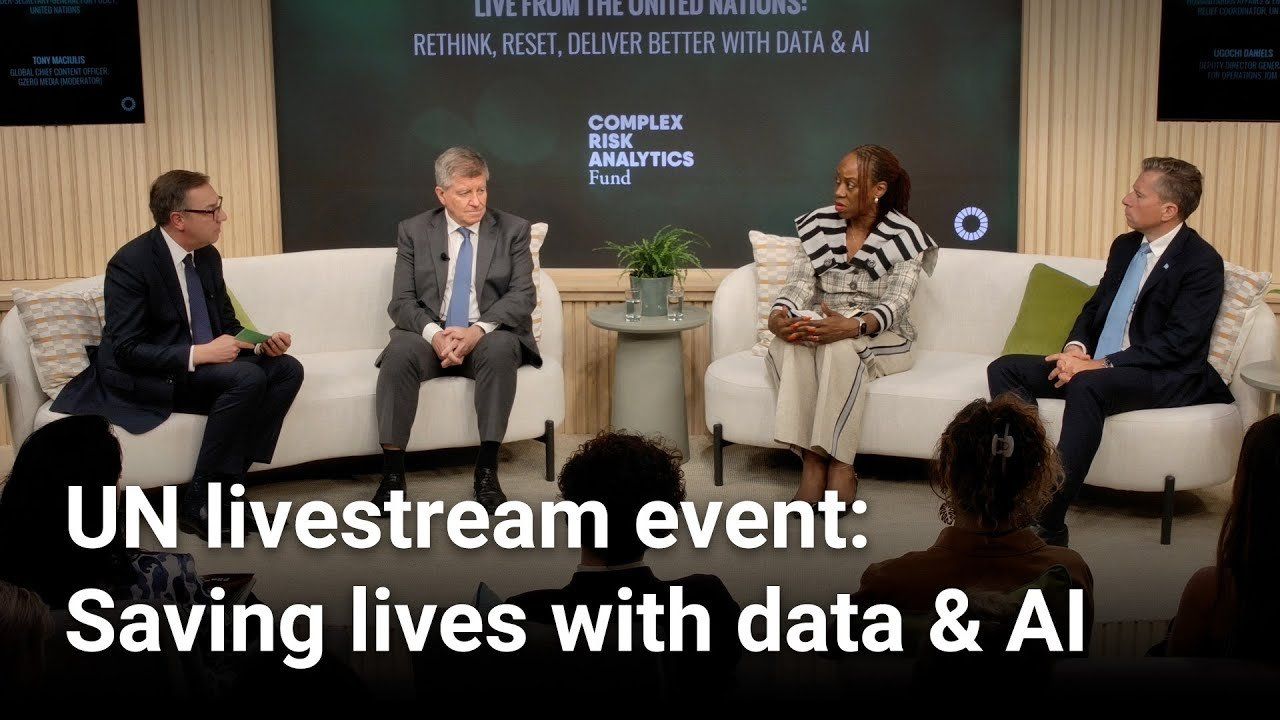September 26, 2025
As the United Nations turns 80, the urgency to rethink global cooperation has never been greater. In a live broadcast from the UN headquarters and moderated by GZERO Media’s Global Chief Content Officer, Tony Maciulis, an expert panel gathered to discuss if AI and data can reshape a strained multilateral system to meet today’s crises.
The conversation featured top UN officials and global partners reflecting on both the challenges and opportunities ahead. Guy Ryder, Under-Secretary-General for Policy, UN, emphasized that multilateralism remains essential but requires sharper results. Tom Fletcher, Under-Secretary-General for Humanitarian Affairs and Emergency Relief Coordinator, noted cautious progress in peace diplomacy while warning of extreme strain on humanitarian workers. Ugo Daniels, Deputy Director, International Organization for Migration, highlighted how data can shift focus from temporary relief to durable migration solutions.
The second panel expanded the lens: Dr. Comfort Ero, President & CEO, International Crisis Group, warned that with 62 conflicts worldwide, the UN remains indispensable but must evolve; Dr. Ahmed Ogwell, CEO & President, VillageReach; former head of Africa CDC, urged better crisis preparedness and stronger community engagement with their own data; and Gunn Jorid Roset, Director General, Norad, reaffirmed Norway’s support for reform and evidence-based aid.
Across both panels, one theme resonated: technology alone cannot end wars, heal trauma, or feed the hungry. But combined with reform, political will, and smarter partnerships, better use of data and AI can help the UN deliver solutions.
This livestream, “Rethink, Reset, Deliver Better with Data and AI,” was an event produced in partnership between the Complex Risk Analytics Fund, or CRAF’d, and GZERO Media’s Global Stage series, sponsored by Microsoft.
More For You
- YouTube
In this Quick Take, Ian Bremmer weighs in on the politicization of the Olympics after comments by Team USA freestyle skier Hunter Hess sparked backlash about patriotism and national representation.
Most Popular
Bad Bunny during the Super Bowl LX halftime show press conference at Moscone Center.
Kirby Lee-Imagn Images
100 million: The number of people expected to watch the Super Bowl halftime performance with Bad Bunny, the Puerto Rican superstar and newly minted Album of the Year winner at the Grammys.
Alysa Liu of Team USA during Women Single Skating Short Program team event at the Winter Olympic Games in Milano Cortina, Italy, on February 6, 2026.
Raniero Corbelletti/AFLO
Brazilian skiers, American ICE agents, Israeli bobsledders – this is just a smattering of the fascinating characters that will be present at this year’s Winter Olympics. Yet the focus will be a different country, one that isn’t formally competing: Russia.
What We’re Watching: Big week for elections, US and China make trade deals, Suicide bombing in Pakistan
Feb 06, 2026
Japanese Prime Minister Sanae Takaichi, president of the Liberal Democratic Party (LDP), appeals for a candidate during a street speech of the House of Representatives Election Campaign in Shintomi Town, Miyazaki Prefecture on February 6, 2026. The Lower House election will feature voting and counting on February 8th.
The Yomiuri Shimbun
Japanese voters head to the polls on Sunday in a snap election for the national legislature’s lower house, called just three months into Prime Minister Sanae Takaichi’s tenure.
© 2025 GZERO Media. All Rights Reserved | A Eurasia Group media company.
